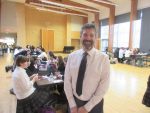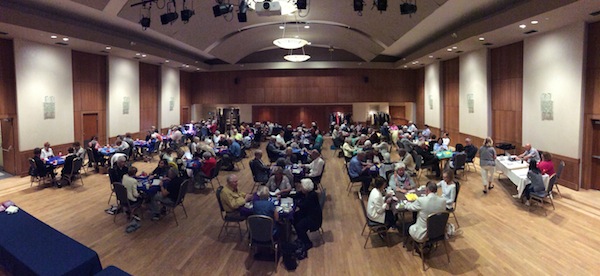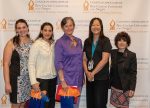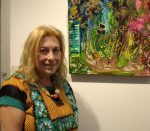Alisa Polsky, left, and Leamore Cohen attended the Jewish Federations of Canada-United Israel Appeal’s Pushing the Boundaries: Disability, Inclusion and Jewish Community conference in Toronto April 15-17. (photo by Liora Kogan)
Jewish Federations of Canada-United Israel Appeal’s Pushing the Boundaries: Disability, Inclusion and Jewish Community conference took place in Toronto April 15-17. It was the first national Jewish conference on these topics, and two representatives of the Jewish Commmunity Centre of Greater Vancouver attended.
Leamore Cohen, inclusion services coordinator at the JCCGV, was a panelist in a discussion on vibrant, inclusive communities and recreation. She was joined at the conference by Alisa Polsky, a member of the Bagel Club, a social group for adults with diverse needs.
“The Bagel Club community is very important for social interaction with other people, and to know there are other opportunities for learning and discovery,” Polsky told the Independent. “I got to discover the Vancouver I didn’t know before.
“The club inspires me to try new things that I’d never tried before. I’ve learned a lot about myself over the years and it has pushed me out of my shell. I’m grateful for this. I’m grateful for all the opportunities the club has provided, like going to Israel with my friends and this conference.”
Polsky has been an active member of the Vancouver Jewish community for years, with volunteering being a value her parents instilled in her as a child. At the time, the educational system had dubbed her “disabled.”
“When I was going to school, I was just pushed through,” said Polsky. “This was elementary school. I didn’t get the education I deserved. I was put into a special needs class. The education system segregated me away from the regular class. The teachers only wanted to work with the ‘normal’ kids.
“I would have liked more schooling. I deserved more schooling. I deserved to be in the classroom with the ‘normal’ kids. This still hurts. I am glad that things have changed, but it’s not enough. Some kids are still segregated today. We have to work together to change that. If not, more kids will feel like I did, which is not fair or right.”
Last year, on the trip to Israel with the Bagel Club, Polsky got to meet Member of Knesset Ilan Gilon, with whom she spoke about the struggles of people with diverse needs in Canada for proper benefit rates.
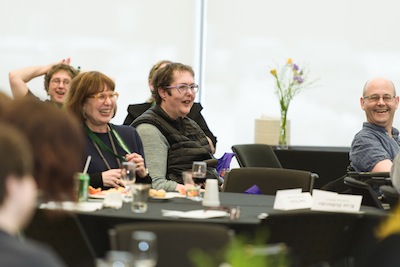
“When the Pushing the Boundaries conference came up, Leamore asked if I wanted to go,” said Polsky. “She told me that she was speaking with the Jewish Federation of Greater Vancouver about having someone from our community attend. She said the Federation believed this was very important. It’s important to see how other organizations work with people with all kinds of diverse abilities, and that people with diverse abilities get to be part of the national conversation.”
This was the first conference Polsky had ever attended. She was happy to discover that, while other organizations charge for various activities, including the Pushing the Boundaries conference, the JCCGV and Vancouver Federation take into account the financial barriers many people with diverse needs face, and do not charge for such programs.
“I loved learning more about the youth-led mentoring programs in Israel, Krembo Wings,” said Polsky. “We got to spend time with them when we visited Israel. When I was younger, I never went to programs like that. I did volunteer and helped kids with learning disabilities learn how to swim. Given the chance, I was able to show that we all have something to give. Organizations like Krembo Wings ensure that the next generation will help each other to learn and achieve their potential, no matter who they are.”
Polsky said it is very important to hear from other Jewish groups about what they offer in their communities and what their issues are. In this way, she said, she and others can be stronger self-advocates and more involved in the community.
Maybe most encouraging for Polsky was realizing that she has partners in her goal for equal rights for community participation, and also that Jewish organizations are beginning to work together across Canada to remove barriers.
“I am overcoming these barriers through my membership with the Bagel Club community, with my family, who have been there for me, through volunteering and through my spiritual community,” said Polsky. “I feel it is my time to give back to the community that has given me so much over the years.
“The conference was about the lives of Jewish people with diverse abilities – and they should be at the table. I am proud that I was at the table with Leamore.”
Polsky said there is a lot to be gained from attending gatherings like Pushing the Boundaries. In particular, there is the opportunity to “exchange ideas and share resources,” said Polsky. “It’s also important to understand our history as Jewish people, and as people with diverse needs in this country. I’d like readers to recognize that we’re all partners in making the community better.”
Some conference highlights for Polsky included the synagogue panel on creating inclusive communities and the recreation panel, in which Cohen took part. There were other topics covered, as well.
“As a Jewish woman and a woman with diverse needs, it was hard, but important to learn about the eugenics movement in Canada,” said Polsky. “This movement meant that a woman who had a pregnancy where a child who was mentally or physically challenged would be encouraged to abort the pregnancy. Families were also encouraged to institutionalize their disabled children. And they also forced sterilization.
“We learned about the denationalization movement and the development of community living.
We also learned about integration into schools and housing developments that are currently being built, which are inclusive and accessible, in Ontario.”
Polsky said she is fortunate to be living in a cooperative, and living independently. She noted that some people with diverse needs, who may require semi-independent living, are still segregated in Canada today, due to zoning laws that keep them out of certain neighbourhoods, which she describes as “horrible.”
“Having participated in this conference,” she said, “I can tell other people what I have learned and I can encourage people in my community to vote and to get active in their communities. I can remind politicians how powerful we can be when we work together and that disabilities communities are large and strong, and that we can make a difference in all aspects of community life.”
For more information about the conference, visit jewishcanada.org.
Rebeca Kuropatwa is a Winnipeg freelance writer.



